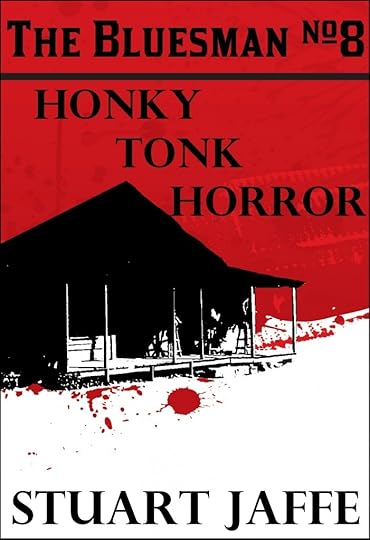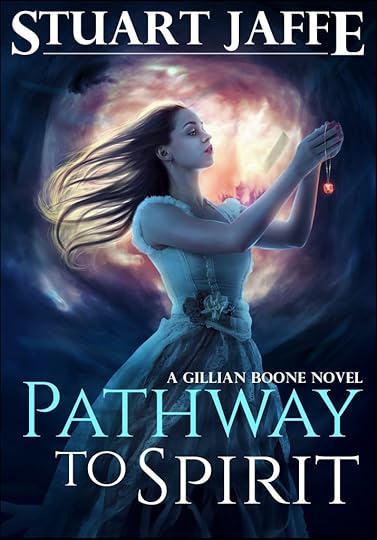Stuart Jaffe's Blog, page 4
March 14, 2014
Science Fiction and Fantasy: Thought We’d Escaped the Genre Ghetto?
Like most Science Fiction and Fantasy fans, I’d hoped the days of relegating SFF books to the back of the bookstore were long gone. But, I came across a blog post earlier this week on Tor.com that gave me pause. Evidently, The Association of Writers and Writing Programs held their annual conference earlier this month. Speculative Fiction legend Ursula K. Le Guin and SF/Historical Fiction writer Molly Gloss were the two keynote speakers. The choice of these two speakers looked promising, considering the conference was not genre-specific in nature. So far, so good.
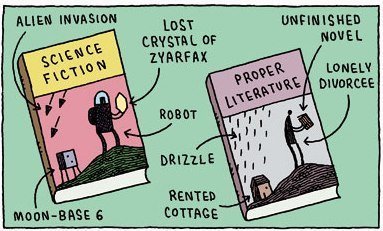
This sums it up great. BTW, I couldn’t find who to give credit to for this, so let me know if any of you figure it out.
The author of the post, an MFA student who writes in the SFF genre, was surprised (pleasantly) to see Le Guin and Gloss featured so prominently on the program. Her words struck me, “If you’re like my friends and me, you’ve been in college or even MFA classes that bar genre fiction entirely, that compare your work to Twilight, and that generally conflate genre with formula, heavy-handedness, and as Brook Wonders phrased it, a lack of ‘aesthetic ambition.’”
Back to School and Back to the Future
Now, I thought this negative attitude toward Science Fiction had largely subsided. When I attended graduate school in the late 90’s, things seemed to have begun to change. Mostly, SFF was still look down upon, but some grad programs had courses in genre fiction, and my professors allowed me to explore genre in my work. We even read classic books like H. Rider Haggard’s She which is most certainly genre. When I started attending convention, the attitude amongst con-goers was that of people who felt they had just stepped out of the ghetto. Over the years, it seemed like attitudes had changed. SFF movies are mainstream, conventions draw a wide ranging mix of ages and types, and television has jumped on the SFF bandwagon in full force. But I guess we haven’t come as far as I thought.
Genre Wars – Alive and Kicking in Literary Circles
For those of you who may have missed the origins of this schism, you should know there’s a longstanding snobbery regarding genre books—this means romance, mystery, fantasy as well as Science Fiction. There are many explanations for this divide. Some say it’s the result of the mainstream’s cooption of SFF writers like Kurt Vonnegut and Angela Carter. Some explain it away by citing SciFi as a casualty of the debate regarding High and Low Culture. Still others seem to accept the premise that SFF, or genre fiction in general, is formulaic, predictable and simply not literary enough to be considered literature.
Whatever the cause, these notions have resulted in a defensiveness among SFF readers and writers alike. Needless to say, I find all of this complete nonsense (and that’s the nice word for it). As far as I’m concerned, Science Fiction is one of the defining literatures of the last century. I don’t understand why some among us still feel the need for legitimacy from the literary or academic old guard. I wonder, if perhaps, it’s actually the other way around?
The Future of Science Fiction is on Terra Firma
Like many Science Fiction or Fantasy writers, I find that the worlds that I build provide fertile settings for me to pose all sorts of interesting questions. Questions about our position in the universe, explorations of humanity in general, as well as a commentaries on the structure and values of contemporary society. I love to explore ideas of identity, race, gender alongside the classic SFF ideas of honor, intelligence, and duty.
I agree wholeheartedly with the sentiments of SFF author Chris Beckett whose 2013 futuristic fantasy, Dark Eden, was awarded the Clark award:
“It irritates the hell out of me when people won’t touch my book because they see it’s science fiction,” he said. “Of course some sci fi is crap. But it can also be so many other things. It’s such a wonderful mechanism for thought experiments …”
For me, the question isn’t why anyone would want to read Science Fiction, or even how to get people to understand how much it has much to offer. The real question is why anyone would want to deny themselves such a captivating and thought-provoking experience.
And don’t forget, most people love SFF as long as they don’t recognize it by that name. The Lovely Bones? Fantasy. It’s all from the viewpoint of a dead girl. Beloved? Fantasy. Without the ghost, the story doesn’t work. Macbeth has witches, ghosts, and spells, and The Road is apocalyptic SF. None of these would dare call themselves anything but literature, yet they really belong alongside the rest of us.
What do you think about this scuttlebutt? Or had you not even heard a word about it? Share your opinions with me. I’d love to hear your thoughts on Science Fiction as the Literature of the Future.
The post Science Fiction and Fantasy: Thought We’d Escaped the Genre Ghetto? appeared first on Stuart Jaffe.
March 13, 2014
Official Release – The Bluesman #8: Honky Tonk Horror
Yup, it’s finally here. The official release of The Bluesman #8: Honky Tonk Horror. Fuller and Scotch return for this eighth installment in The Bluesman short story series, and this time out, it’s a mind-bender of pulpy fun! Here’s the cover:
And here’s the blurb:
The Bluesman – musician, magician, lethal killer. Thrown to Earth from a parallel universe, the Bluesman seeks to save our world from being overrun by the horrid, mutated creatures that came with him. Armed with magic, skill, and his companion, Scotch, he faces these monsters hoping to create a peaceful world for all.
In Honky Tonk Horror, an evening gigging at a local dive bar turns deadly when a monster posing as a human enters the crowd. Scotch takes the lead while the Bluesman plays the music that might just save his life.
All The Bluesman short stories are only 99-cents, so give The Bluesman #8: Honky Tonk Horror a try and have a great time!
The post Official Release – The Bluesman #8: Honky Tonk Horror appeared first on Stuart Jaffe.
March 7, 2014
Page-Turners and Pulp Fiction in the Digital World
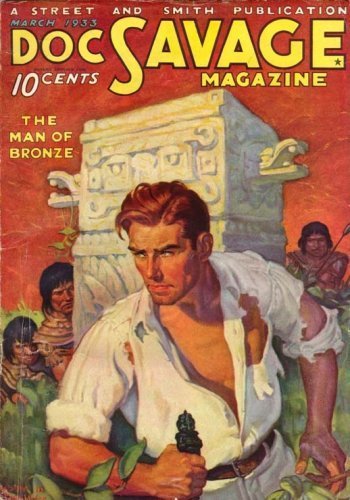
Hard-boiled crime. Bodice-ripping romance. Epic tales of mythological proportions. Futuristic fantasy in a parallel universe. Suave international men of mystery. These are the stuff that put the pulp in pulp fiction. You know what I’m talking about…Conan, The Shadow, Doc Savage, even James Bond —all incarnations of pulp fiction.
Since their heyday in the 20s and 3os, readers have always eaten these books up and eagerly snatched up each new book in the series. Once hooked, readers kept coming back for more. The books were cheap. They were a quick read. And you could easily fit one in your back pocket. The lure of pulp fiction is not lost on readers today. Because of advancements in digital publishing technology, series fiction is making a major comeback.
The tablet may have replaced the pulp but the appetite for series fiction remains. I, for one, couldn’t be happier about it.
Series and Serials – Do You Know What You’re Reading?
I recently attended MystiCon—an annual conference for Science Fiction, Fantasy and Pop Culture—in Roanoke, Virginia. During one of the panels on the craft of writing we got into a side talk (as often happens on panels at SF cons) discussing the difference between series and serials. It quickly became clear that, for some, the lines were blurred.
For me, the distinction is crystal clear. Ian Fleming’s James Bond stories represent perfectly what I believe good series fiction should accomplish. From Live and Let Die to Goldfinger, each book in the series can be read as a self-contained story chronicling the adventures of 007 – British Secret Service Agent, James Bond. Even if you’ve never read any of the other Bond books, you can pick up Dr. No, or perhaps Octopussy, and have a satisfactory reading experience from start-to-finish. However, when read in the context of a series, the stories enhance one another as a whole. For readers who are familiar with the other books in the series, the overarching experience is vastly enriched…They’re left both shaken and stirred.
My paranormal mystery series, the Max Porter Mysteries, function in a similar fashion. You can pick up Southern Belle, the latest book in the series without having read the first, Southern Bound, and still enjoy a complete story. But if you’ve perused the earlier Max Porter tales, you’ve got some a priori knowledge for a richer read. Heck, I’m just happy that you’re reading my books in any order and thanks to those of you who are.
The Cliffhanger Cop-Out
What makes readers keep coming back for more? In serial fiction, the multiple books comprise one full story. In other words, the first book doesn’t really contain a complete book. It’s just Part 1. Lord of the Rings is a prime example. Written as one very long book, the publisher broke it up into three. Some writers rely upon the cliffhanger to ensure that readers are left wanting more and thus, come back for Part 2. Personally, I don’t like to do that to my readers—I think you deserve more than a cheap ploy. From what I can tell, readers really want a series where they can really get to know and grow along with the characters. But, they also want serial fiction in which they are surprised and in which characters change over time.
On a more personal note, if I’m writing a series and nothing’s changing, I get bored as a writer. And, if I’m bored, I’m pretty sure that my readers have lost interest too. In my Post-Apocalyptic Fantasy series, the Malja Chronicles, the protagonist Malja evolves significantly in each book. While at core she is the same character, the Malja you meet in the fourth book, The Way of the Blade, has grown from a girl into a kickass force to be reckoned with.
How do you like your series fiction?
I like to give my readers what they want…and something that they don’t expect with each turn of the page. That way, you get the best of both worlds. How about you? Do you like the cliffhanger? Or, does it make you completely bonkers to have to wait until the next book comes out to resolve a key plot issue? I’d like to know. Who knows? I may even change my mind. For now, I’ll just leave you hanging.
The post Page-Turners and Pulp Fiction in the Digital World appeared first on Stuart Jaffe.
March 6, 2014
Official Release – Pathway to Spirit
Yup, it’s here. The Official release of Pathway to Spirit. Here’s the beautiful cover:
And here’s the blurb:
After defeating an army of Callers, Gillian Boone wants nothing more than to return to the life of a normal teenager. But when her new boyfriend is abducted by something even worse than a Caller — a Proxy of Spirit — she has no choice but to jump back into the crazed world of the Marked, the Bound, and Spirit. Now, the race is on to get her boyfriend back and in one piece. With the help of Pops and some new allies, Gillian has a good chance to succeed. But then, she’s also got Jackhammer Jack on her side — at least, she hopes he’s on her side.
Fast-paced and action-packed, Pathway to Spirit is everything you’ve come to expect from the chaotic life of Gillian Boone.
So start off your weekend right. Get Pathway to Spirit today and enjoy the adventure!
The post Official Release – Pathway to Spirit appeared first on Stuart Jaffe.
February 27, 2014
Women and Science Fiction: Through a Brave New Portal
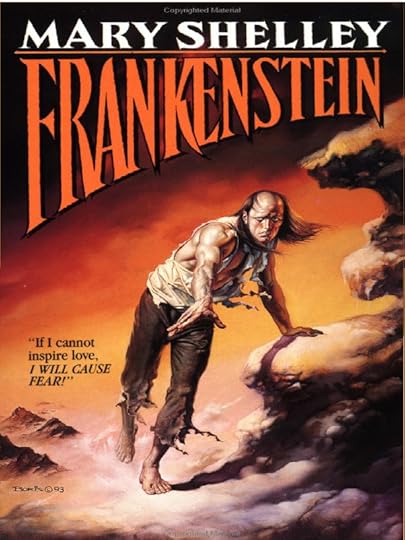 When Mary Shelley published Frankenstein in 1818, she wrote what many consider the first Science Fiction novel. Shelley’s lesser-known The Last Man, from 1826, even explores the notion of the apocalypse. Other women wrote Utopian novels prior to that in the 17th century. So, you could say that women invented Science Fiction.
When Mary Shelley published Frankenstein in 1818, she wrote what many consider the first Science Fiction novel. Shelley’s lesser-known The Last Man, from 1826, even explores the notion of the apocalypse. Other women wrote Utopian novels prior to that in the 17th century. So, you could say that women invented Science Fiction.
Yet some readers have this crazy idea that women aren’t capable or qualified to write in the genre. Other critics object to the feminization of SF, or feel that female heroines aren’t believable because real-world women can’t kick some serious ass. Still others prefer their female characters simply to provide a romantic component or serve a biological necessity for the procreation of the human race.
Some have even gone so far as to suggest that women are destroying Science Fiction. To put it mildly, I find such suggestions to be utter crap. I’ve never understood how anybody could think that half of the human population is somehow less valuable than the other half. We kind of need both to survive. Not just biologically, but we’ve evolved to complement each other’s strengths and weaknesses. When it comes to imagining our future, reflecting on our present, or exploring our past, it’s inconceivable to me that we would deny half our brain trust. I applaud the team at www.lightspeedmagazine.com for dedicating themselves to exposing the fallacy behind this outdated assumption. I look forward to reading their Kickstarter-funded project “Women Destroy Science Fiction!” when it comes out this summer.
Science Belongs to Us All – So Does Science Fiction
Like most writers, I’ve loved books and movies since I was a kid. And, of course, I identified with the, largely male, heroes of the SF books and movies I voraciously consumed. I identified with Han Solo and Starbuck, and I didn’t give much thought to the Princess Leas of my day (except to marvel at her exposed midriff – hey, I was a teen). This was back in the 70s and 80s, and few women were front and center for all of the action, adventure and world-saving inherent to the Science Fiction genre. In most Science Fiction of the time, technology had advanced, and yet somehow women were still mothers or helpers or vapid love interests in need of rescue—if they were there at all.
Sure, Isaac Asimov gave it a shot with one of his most famous creations, Susan Calvin—a great heroine but not very female. In a way, she’s the scientist version of the warrior that’s a man in woman’s clothing. Imagine Conan in a dress. She’s a not too-pretty, cold, pragmatic scientist with more conventionally masculine traits. Although to Asimov’s credit, Calvin is also strong, smart, and right most of the time.
I knew that women were writing SF books but you’d have to look hard to find their work. When I discovered authors like Ursula K. LeGuin, Octavia Butler, and Nancy Kress, it was like walking through a portal to a new world of SF possibilities. Like male authors, these women wrote fiction that grappled with the vastness of the cosmos and the fate of the human race in a technologically accelerated landscape. Further, they were creating strong female characters with the depth and complexity of actual women. That just makes good sense. Ultimately Science Fiction is about humanity and its survival—all of humanity, men and women.
Badass Women Writing and Kick Ass Heroines
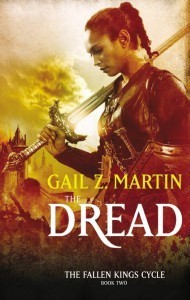 Fast forward a few decades and women continue to write Science Fiction and Fantasy in greater numbers—authors like Sara Hoyt and my friend, Gail Z. Martin. I’m happy to be among their ranks. The genre is better for it. I’ve been writing SF, Fantasy, and Post-Apocalyptic fiction for close to twenty years now. Some of the characters that my readers respond most positively to are my female heroines. I find writing from a female perspective both challenging and rewarding at once.
Fast forward a few decades and women continue to write Science Fiction and Fantasy in greater numbers—authors like Sara Hoyt and my friend, Gail Z. Martin. I’m happy to be among their ranks. The genre is better for it. I’ve been writing SF, Fantasy, and Post-Apocalyptic fiction for close to twenty years now. Some of the characters that my readers respond most positively to are my female heroines. I find writing from a female perspective both challenging and rewarding at once.
The heroine of my Post-Apocalyptic series The Malja Chronicles is decidedly kickass. Malja is a rugged, powerful, independent killer to be sure yet she’s hardly devoid of femininity, or sexuality for that matter. In Pathway to Spirit, the second book in my YA Dark Fantasy series, young heroine Gillian Boone finds herself in extraordinary circumstances as she chases down monsters in order to save her boyfriend. That’s right, this time it’s the guy who is the damsel in distress! Although Gillian’s battles are with grotesque supernatural creatures, she struggles with the same challenges as a regular teenager—only much more extreme.
Friends of my 16-year-old son, male and female, have told me how much they enjoyed the first Gillian book, A Glimpse of Her Soul, and that they anticipate the next (coming out next month!). As a writer, and a father, it doesn’t get much better than that.
Who’s your favorite female Science Fiction author? And why?
I would love to hear your thoughts on women and Science Fiction. Who are your favorite heroines of film and print? Clearly, I’m all for it. Science Fiction is a big tent—big enough for all of us.
The post Women and Science Fiction: Through a Brave New Portal appeared first on Stuart Jaffe.
February 20, 2014
Young Adult Fantasy Books: Not Just for Kids Anymore
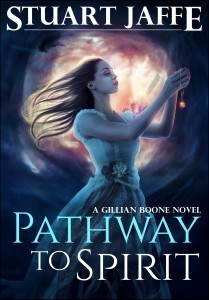 Alright folks, time to come clean. We all fell for it when you explained away reading the first Harry Potter novel, Harry Potter and the Philosopher’s Stone, because you were reading it along with your kids—that was just good parenting. But, that was back in 1997. Seven Potter books and fourteen years later, you are still psyched when a film adaptation of one Rowlings’ Young Adult Fantasy books makes it way to the big screen (this is, of course, assuming that some of her short stories or the as-yet-unwritten Harry Potter and the Curse of Middle Age ever get made). It’s safe to say your children have grown up and can read all by themselves now yet you still have Fantasy fever.
Alright folks, time to come clean. We all fell for it when you explained away reading the first Harry Potter novel, Harry Potter and the Philosopher’s Stone, because you were reading it along with your kids—that was just good parenting. But, that was back in 1997. Seven Potter books and fourteen years later, you are still psyched when a film adaptation of one Rowlings’ Young Adult Fantasy books makes it way to the big screen (this is, of course, assuming that some of her short stories or the as-yet-unwritten Harry Potter and the Curse of Middle Age ever get made). It’s safe to say your children have grown up and can read all by themselves now yet you still have Fantasy fever.
Perhaps you were bitten by the Twilight bug? And few among us have lost our appetite for The Hunger Games. (And don’t forget that little yet action-packed Gillian Boone series.  I hear good things about that one!) Don’t worry. You’re not alone. Maybe Harry Potter was your gateway drug to the Young Adult genre, but plenty of grown-ups are shamelessly reading Fantasy books and the audience is growing everyday. Fantasy is not just for kids anymore. And, I think I have a few ideas why.
I hear good things about that one!) Don’t worry. You’re not alone. Maybe Harry Potter was your gateway drug to the Young Adult genre, but plenty of grown-ups are shamelessly reading Fantasy books and the audience is growing everyday. Fantasy is not just for kids anymore. And, I think I have a few ideas why.
5 Reasons That Adults Love Fantasy Books
1. Fantasy is familiar – When most of us were growing up, we read or were told fairy tales depicting some sort of transformation or coming-of-age theme. Bedtime stories like Little Red Riding Hood and fairy tales like Hansel and Gretel or Peter Pan feature characters on the cusp of young adulthood and we experience the fear, the anxiety, and challenges of that process along with them. Good Fantasy stories, whether intended for children or adults, almost always involve characters that learn and grow. Readers have come to expect that and we find it satisfying to read about growth and transformation. Besides, who really wants to grow up?
2. Fantasy is Otherworldly – Modern life has become so complicated and technologically advanced, sometimes adults wish they could simply press “EJECT” and be propelled to a parallel universe. In Fantasy books, that scenario is not out of the realm of possibility…not at all. Characters walk through doors, move a book on a shelf, and, magically find themselves transported to another place, time, or dimension. Reading Fantasy is a great way to escape the here and now—if only for the time it takes you to read on your commute home from your impersonal high-tech workplace. Feeling overwhelmed? Pick up a YA Fantasy book, and disappear…like magic!
3. Fantasy is Multi-Layered – Sure, at first glance, some Young Adult Fantasy books seem to be merely fun superficial escapist reading. And, if that’s how you enjoy reading, that’s fine with me—as long as you’re reading one of my books, knock yourself out. Some teens and young adults, and plenty of grown-ups for that matter, may simply enjoy the fantastical storylines and not pick up on any critical commentary that lies beneath the surface. I can assure you though; it’s there—the literary allusions, the socio-economic and political commentary, the critique of contemporary social mores. Think about The Wizard of Oz or Beauty and the Beast for half a second and you’ll catch my drift. Just depends how deep you want to go. For Fantasy fans, that’s part of the fun.
4. Fantasy is Optimistic – Some contemporary fiction these days can be a real downer. Adults may read stories for young people because we are ultimately looking for a happy ending, or, alternately a cliffhanger that keeps us wanting more. Fantasy and YA books often have an upbeat tone of hope and wonder at the world and, generally, feature likable heroes or heroines who win out over the more monstrous in their midst. Too many adult novels are depressing and downbeat and outside of the protagonist most of the characters are hard to root for. Plus, the style of prose that is no fun to read when relaxation and escapism from a stressful day is the goal. Who wants to keep index cards at the ready to recall information from a previous novel or 300 pages ago for parts of the story to make sense? That’s work – the world is depressing enough. Fantasy is fun!
5. Fantasy is Good – It’s really not that complicated, folks. Readers, young and old, will read what’s good. Plenty of works written for people of various ages have fallen by the wayside because they’re not good while the cream rises to the top to be enjoyed by everyone. In Robert Heinlein’s day, he wrote books for young people but, because of their excellence, adults read his books as well. So, it’s simple…if Young Adult Fantasy books are good, people will read. If not, then they won’t. And that, my friends, is that (whisks hands together with conviction).
Are you an adult who is ashamed to admit that you read Fantasy or YA books?
It’s time to take the brown bag off your books and come out of the closet. You’re here, you’re a grown-up, you read Fantasy…Get used to it. What are some of your reasons for reading Fantasy and YA Fiction? I’m sure I missed a few and would love to hear your lame excuses!
The post Young Adult Fantasy Books: Not Just for Kids Anymore appeared first on Stuart Jaffe.
February 18, 2014
Cover Reveal – Pathway to Spirit and a Special Offer
Hi, Folks! As promised, I’ve got some cool stuff to share including a cover reveal. First off, the new Gillian Boone novel is coming soon. Mid-March, in fact. To celebrate and help y’all get ready, I’ve lowered the ebook price of Gillian’s first outing, A Glimpse of Her Soul, from $3.99 to only 99-cents! This is for a limited time, so don’t miss out.
And here’s the cover and blurb for the next Gillian book, Pathway to Spirit. Enjoy!
After defeating an army of Callers, Gillian Boone wants nothing more than to return to the life of a normal teenager. But when her new boyfriend is abducted by something even worse than a Caller — a Proxy of Spirit — she has no choice but to jump back into the crazed world of the Marked, the Bound, and Spirit. Now, the race is on to get her boyfriend back and in one piece. With the help of Pops and some new allies, Gillian has a good chance to succeed. But then, she’s also got Jackhammer Jack on her side — at least, she hopes he’s on her side. Fast-paced and action-packed, Pathway to Spirit is everything you’ve come to expect from the chaotic life of Gillian Boone.
The post Cover Reveal – Pathway to Spirit and a Special Offer appeared first on Stuart Jaffe.
February 13, 2014
Walking on the Moon: Is Over-the-Moon Love Merely Fantasy Fiction?
“You know you’re in love when you can’t fall asleep because reality is finally better than your dreams.” That’s how Dr. Seuss, one of the masters of fantasy fiction, described the feeling of being in love. And it sounds all romantic and true, but is Dr. Seuss’s assertion simply nonsense? In honor of Valentine’s Day, this post takes a look at love in the realms of fantasy and science fiction—particularly at how love has enhanced both my world-building and storytelling.
I’m not talking about erotic paranormal romances—although when written well, can make for some compelling reading and some pretty steamy stuff. But I am looking at real love between friends and between lovers and the role it can play in science fiction or fantasy fiction.
Every Little Thing She Does is Magic
 I’ve been told that my stand-alone novel, Real Magic, defies genre categorization. However, I recommend the book to any reader who likes mystery, time travel, magic, card tricks, fantasy fiction…and, love stories. There, I said it. The overarching plot follows the misadventures of main character, Duncan—a card- playing trickster who is constantly on the run from debtors from 2013 as he travels back in time to 1934. But in many ways, Real Magic is a good old-fashioned love story.
I’ve been told that my stand-alone novel, Real Magic, defies genre categorization. However, I recommend the book to any reader who likes mystery, time travel, magic, card tricks, fantasy fiction…and, love stories. There, I said it. The overarching plot follows the misadventures of main character, Duncan—a card- playing trickster who is constantly on the run from debtors from 2013 as he travels back in time to 1934. But in many ways, Real Magic is a good old-fashioned love story.
When we first meet Duncan, he is not the most likable of characters. He’s a fast-talking self-motivated confidence man who’s just trying to meet his own needs one step at a time. However, once he finds himself transported to 1934, Duncan also finds love. Her name is Lucy and his love for her transforms him from a self-serving dodger into a character who tries to do the right thing. In many ways, love is the real magic for Duncan’s redemption (see what I did there? Nifty!).
Spirits in a Material World
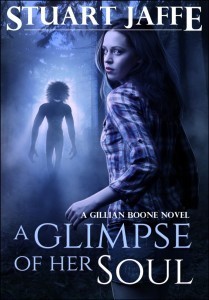 For those of you who read the first novel in my Young Adult Urban Fantasy series featuring Gillian Boone, A Glimpse of Her Soul, you know that it is filled with action, excitement, magic, and mystery. And just the kind of genre bending many of you have come to expect from a writer whose motto is Fantasy Knows No Bounds…I’m talking about me (and, yes folks, I am aware that I just referred to myself in the third person—totally in jest).
For those of you who read the first novel in my Young Adult Urban Fantasy series featuring Gillian Boone, A Glimpse of Her Soul, you know that it is filled with action, excitement, magic, and mystery. And just the kind of genre bending many of you have come to expect from a writer whose motto is Fantasy Knows No Bounds…I’m talking about me (and, yes folks, I am aware that I just referred to myself in the third person—totally in jest).
When we leave Gillian on the final pages of A Glimpse of Her Soul, the sixteen-year-old heroine has had a first love and a first loss. We’ve all been there and we know how complicated, raw, and torturous that experience can be. I can still remember when I learned that Joan Jett would never be in the cards for me. Okay, perhaps that’s not quite the same thing.
While my first Gillian book is more of a dark, horror, coming-of-age story about a typical high school girl who finds herself in an atypical situation—on the run to escape from strange creatures who are hunting her down with the intent to kill—the upcoming second book in the series, Pathway to Spirit, takes a more romantic turn. Well, in so much as chasing down those monsters in order to save her new love can be called romantic.
Side note: I will be doing a cover reveal very soon and anticipate its release in March. If you haven’t picked up A Glimpse of Her Soul yet, you can get it here (the ebook is on a major, big time sale for a little longer) and get ready for Gillian’s next escapades as well as her initial encounter with romantic love in Pathway to Spirit.
When the World is Running Down, You Make the Best of What’s Still Around
Even in a Post-Apocalyptic landscape, or perhaps especially so, in such an unusual and unpredictable world, love is an emotion that readers can truly identify with. In my Malja Chronicles, the binding platonic love between friends serves to both move the narrative forward as well as reveal the depth of characters that might otherwise come off as one-dimensional. The Way of the Black Beast is the one that started it all in what is now a four-book series (if you don’t know the series, here’s a bit about it: In a parallel world destroyed by the abuse of magic, Malja fights all odds to survive and find the answers behind her mysterious past. Despite the challenges – crazed magicians, guitar-playing assassins, mutated beasts – she pushes on with a single-mindedness that may destroy all she holds dear).
What Malja holds most dear are her two closest friends, Fawbry and Tommy. Above all else, she has sought a path home. With the help of her companions who have become like family, who she loves like brothers, Malja may finally have her chance. Caught between those she loves and that which she desires most, Malja will have to risk everything—friendships, lives, even her chances to get home—in order to save it all. Once again, the motivating force behind my fantasy fiction protagonist is love. And, in this Post-Apocalyptic world, Malja makes the best of what’s still around—her love for Fawbry and Tommy.
Have You Ever Walked on the Moon for Love?
Or do you simply enjoy reading about it? I’d love (yes, really love) to know how you feel about the place of love in Science Fiction, Fantasy or YA Fiction. Would you continue reading if a story was devoid of love entirely? Please share your thoughts with me and I wish you all a Happy Valentine’s Day filled with love—whether romantic, platonic, or cosmic.
The post Walking on the Moon: Is Over-the-Moon Love Merely Fantasy Fiction? appeared first on Stuart Jaffe.
February 6, 2014
Fandom Unbound: Geeks and Sports Nuts Join Hands
Face paint? Check! Menacing or magical costume? Check! Fake beard, multicolored Afro, or long braided hair? Check! Foam finger or light saber? Check! Helmet or body armor? Check! Tickets to the big event. Check. Check. Double check! Inability to contain your excitement? Well, that’s inevitable…Let’s face it. You’re not merely a geek or a fan. You’re a fanatic. And, you don’t care who knows it.

Is this really any different…
Now, for the record, I am aware that geeks can also be sports fans. I suppose sports fans can also be geeks—although, I confess, not from much personal experience. I mean if I’m at a Super Bowl party, I may watch a play or two between nachos. But, I rarely go out of my way to watch the World Series and, when March rolls around, I’m not filling out any brackets. But, I can appreciate sports fans for their enthusiasm and loyalty in much the same way that I appreciate Sci-Fi geeks for their dedication to Star Wars or Dr. Who.
Before we go any further, I feel I should issue a disclaimer. This post is all in good fun. I’m making very general statements. Most important, I am not judging. Let your geek flag fly.
Fan or Fanatic? Channeling Your Inner Geek
If you’re not sure if you’re a fan or a geek, here’s what Wikipedia has to say on the matter:
The word geek is a slang term originally used to describe eccentric or non-mainstream people, with different connotations ranging from “an expert or enthusiast” to “a person heavily interested in a hobby”, with a general pejorative meaning of “a peculiar or otherwise dislikable person, especially one who is perceived to be overly intellectual”.
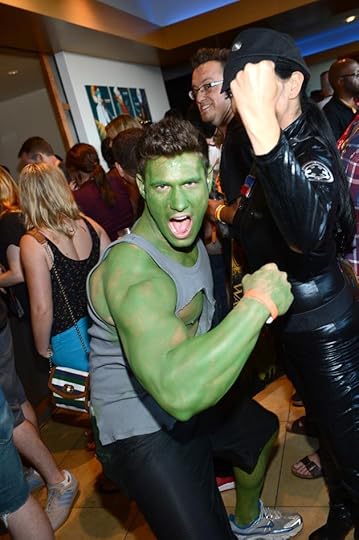
… from this?
I’d add that, while often construed as negative, the term geek has evolved over the past decade or so and is often used as a self-referential source of pride. Yeah, I’m a computer geek, but one day you’re going to work for me. And, further, the term also connotes an immense knowledge of a particular topic or field. I’m a rabid Mets fan—I know the on-base percentage for every player in the line-up. I guess you could say I’m a baseball geek.
I find the description from the web journal, SLACKPROPAGATION, spot on. A writer who goes by the name burrsettles describes “geeks as ‘collection’ oriented, gathering facts and mementos related to their subject of interest. They are obsessed with the newest, coolest, trendiest things that their subject has to offer.” Sounds like a lot of Science Fiction and sports fanatics that I know.
Authenticity is Key – Get Your Geek On
If you’ve ever attended a big tailgate party outside the stadium before a game, it bears a striking resemblance to the many Science or Fantasy Fiction conferences that I attend throughout the year (which reminds me – I’ll be at Anachrocon next week and Mysticon the week after!).
Both fans love to pay dress-up in homage to their particular object of fandom. They sport outrageous and often meticulously constructed costumes, make-up, and headgear. From the orange and blue face and body paint of Broncos football fans at the Super Bowl to the Avenger du jour. Whether decked out as Iron Man or Thor, you can bet these Marvel comic geeks are dead ringers for their superhero.
Both groups love to socialize with people from their own tribe. These gatherings provide the opportunity to rub elbows with other fans that actually know what you’re talking about. Remember how excited you were when you heard the announcement that Firefly was being made into a movie. Or when you finally saw the much-anticipated release of the first trailer for The Fellowship of the Ring. And football fans experience the same conviviality when they learn that their highest performing running back has been taken off the injured list and is cleared to suit-up. High fives all the way around—it’s going to be one hell of a game.
Memorabilia.‘Nuff said, right? Player’s helmets, signed jerseys, game balls, autographs, trading cards all with certifications of their authenticity. Then there are the action figures (Han Solo is one of the top favorites. Oh, to have all my old Star Wars toys back) in their original packaging, of course, vintage comic books, photos with George R. R. Martin or William Shatner, light sabers, and weaponry of every fantastical permutation. I could go on (and on) but you get my point.
This last similarity may surprise those of you who’ve never experienced a Science Fiction convention:the drinking. Now, tailgate parties are well known for the copious amounts of booze consumed. For many, that’s the whole point. But, don’t let the seemingly mild-mannered geek’s everyday civility fool you. When Browncoats, Stormtroopers, Ghostbusters and Klingons attend a convention, they’ve got more than TV and film trivia on their minds. Every hour is cocktail hour. Sports fans may have their team spirit, but there is no shortage of liquid spirits among geeks. Not at all.
Geektacular v. Sportstacular
The point I want to make is that geeks and sports fans have more in common than either one of us probably likes to think. The biggest common denominator, as I see it, is passion. And, I think that’s pretty cool. Whether you’re geektacular or sportstacular, I’d love to hear some feedback from some hardcore fans. Leave a comment and, as I’m officially a geek, I’ll respond immediately.
The post Fandom Unbound: Geeks and Sports Nuts Join Hands appeared first on Stuart Jaffe.
January 30, 2014
How to Write 3-4 Fantasy Books in a Year
Before I get started, for those of you who like cheap ebooks, check out the bit at the end.
Now to today’s post.
[image error]
I’ll bet this guy wished he knew the answer.
I go to a lot of conventions, speak at schools, work one-on-one with writers, and give advice online. Much of that time is talking craft but some of it is business. Oftentimes I find myself saying the same things again and again, which on one hand is not bad — the information needs to get out — and on the other hand suggests something not so good — that the information is not getting out.
For some reason, I found myself last month giving the same info to half-a-dozen writers at different times. All coming from the same shocked question — “How do you write so much?”
So, in the interest of saving time (giving me more time to write or procrastinate), here is the shocking answer:
I don’t write so much. I only put out about 3-4 books a year plus a few short stories. Now, that may seem like a lot, but here is the proof that not only is this not a lot, but that you (yes, you) can do it too. Check this out:
How I Do It. The Math.
Don’t freak out. The math is basic stuff. Real basic.
Okay. On average, a professional writer like me can put out about 1,000 words per hour. That’s only an average. Some days I do more. Some I do less. This is accomplished by having written for years, so I have learned some skills, and by plotting ahead of time. When I sit down to type at the keyboard, I don’t have to waste my time figuring out what happens next.
So, if you can write 1,000 words per hour and you write 1 hour each day, at the end of a year you will have written 365,000 words (1,000 x 365 days). That, folks, is about 3-4 novels.
For only one measly hour a day!
What about the other hours of the day? Well, that’s where you spend time plotting and planning. That’s where you edit and proofread, design covers, send out review copies, write blog posts, etc, etc, etc.
And if you have a day job, that’s when you do that day job thing.
But Stuart, you say, I can’t do all that plotting while I’m at work and I’m too exhausted to do it when I get home.
Well, if you could handle that math above, then this will really blow your mind:
Let’s take out 65 days of writing. Let’s give you Two Whole Months plus a few days that you don’t have to write at all. Lump those days together or spread them out. That’s up to you. The end result:
365 days – 65 days = 300 days
300 days x 1,000 words per day (for only one hour of writing) = 300,000 words
Guess what? That’s 3 novels. And if you write shorter length novels, that could be 4 novels. For only 1 hour of writing and two months of vacation to come up with ideas and plotting and such.
It’s not that hard to do.
Okay, Stuart, you say, then why don’t you write 10 novels a year?
Good question. For any full-time professional writer, there are always lots and lots of business things that need to be done (you know, like writing blog posts). These things take away from fiction writing time. When I go to conventions, my writing output often cuts to at least half of normal if not more. So, that’s part of it.

This is how many feel when contemplating writing so many novels.
But, in truth, as I’ve laid out these simple numbers for others, I’ve started to ask myself that same question. Why don’t I write even more? And the answer — I’m going to write more. This year I plan to get at least 5 if not 6 books done. How? I write 1,500 words a day instead of 1,000. Not a huge change, really. As long as the business stuff doesn’t get too crazy — which, of course, it will (in fact, I’ve just received an email which may complicate a few months coming up!).
Also, keep in mind that all we’ve been discussing here is the number of words, not the quality. You still need to learn your craft. If not, you may put out lots of words but they won’t amount to much. So, while I could conceivably put out 10 novels this year, I also need to feel comfortable that I’m keeping up the quality level. Otherwise, what’s the point?
By the way, plenty of other writers put out more work than I do and keep their quality up. Dean Wesley Smith has been doing a blog diary of his daily writing routine and tracking his numbers. Check it out if you need more convincing. Or use it like I do, for inspiration!
You can do it!
The point of all this post, however, is simply that numerically speaking, little effort is required to produce a lot of work. You can do it, too. And you don’t have to do it tomorrow. When I first started writing, getting 250 words done each day was a challenge. That’s about 1 page. That resulted in one book done after about a year. With practice and understanding, my daily word count has gone up. Yours will too.
Cheap Books Promo Stuff
You know all that business stuff I kept referring to above. Well, one business decision I’ve made for this year is to get more books out to you guys. Both in new books and old. One way to do that is by offering lots of specials all year long. There will be 99 cent books, some free books, a few Kindle Countdown deals, and more coming your way. I’ll announce stuff here on the blog, but if you sign up for the monthly newsletter (up top on the right) you’ll know about everything first, and you’ll get more time to snatch up each offer. Plus, you’ll get your first Freebie which is a short story that only goes to new newsletter subscribers!
Oh, and since the next newsletter goes out in a few days, the first cheap promo is coming fast!
The post How to Write 3-4 Fantasy Books in a Year appeared first on Stuart Jaffe.

